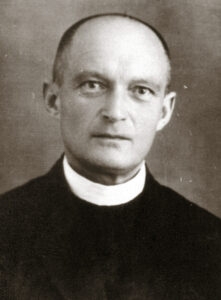Władysław Bukowiński was born on 4 January 1905 in Bedrychiv (now in Ukraine). In 1920, due to the Polish-Soviet War, the Bukowiński family moved to Krakow, where Władysław was ordained priest in Wawel Cathedral. He first served as a priest in Rabka and Sucha Beskidzka, then he transferred to Lutsk.
In September 1939, Lutsk was occupied by the Soviets. In August 1940, pr. Bukowiński was arrested by the NKVD and incarcerated in Lubart’s castle, where, in June 1941, he survived the prison massacre – untouched by any bullets during the mass execution and buried under the bodies of the murdered inmates.
In January 1945, he was arrested by the Soviets, who had taken Volhynia again. Soon he was sentenced to 10 years in forced-labour camps. He worked mostly in logging the Ural forests in Chelyabinsk camps and in the “Pokro” copper mine in Jezkazgan. Despite the hard work and sickness that almost cost him his life, he celebrated Mass every morning and visited the sick after work.
In 1954, he was sent to Karaganda, where he became a night watchman at a coal combine. He was conducting secret pastoral activity during this period, celebrating Mass in private apartments. In 1955, he was allowed to return to Poland but gave up this opportunity for Soviet citizenship so that he could permanently serve as a priest in Kazakhstan. He resigned from the watchman’s job and focused solely on priesthood. In 1959, he was sentenced to three years of forced labour for creating a church illegally and religious agitation. He worked again in logging, this time near Irkutsk. As a priest he served people for several decades. He was widely regarded as a saint when he died on December 3, 1974, in Karaganda. He was beatified on September 11, 2016, in Karaganda. He is called “the apostle of Kazakhstan”.




